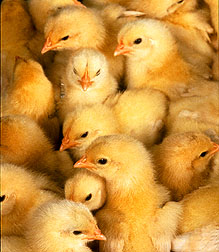Our Planet Weekly - Week of September 27th, 2009
 |
|
| ||||||||||||||||||||||||||||||||||||||||||||||||||||||||||||||||||||||||||||||||
Labels: agriculture, ecology, energy, environment, health, species, vegan, vegetarian
Vegetarian In Boston Maynard S. Clark's Veggie and Boston Blog talks about vegetarian topics AND Boston-related topics, often intersecting them interestingly. Maynard S. Clark is a long-time and well-known vegan in Greater Boston, who often quips in his 'elevator pitch': "I've been vegan now for over half my natural life, longer than most human earthlings have been alive."
 |
|
| ||||||||||||||||||||||||||||||||||||||||||||||||||||||||||||||||||||||||||||||||
Labels: agriculture, ecology, energy, environment, health, species, vegan, vegetarian
Today at lunchtime I attended an HSPH presentation on www.mocamobile.org (MIT and HSPH developers for global health applications by cellphone/wireless devices that transmit photos and patient info to secure servers) and www.dossia.org (employer-insured systems that collaborated with MIT and HSPH developers - builds in patient incentives to personal responsibility for maintaining and developing personal wellness).
Very promising!
Labels: Boston, Cambridge, global health, Harvard, healthcare, HSPH, IT, MIT

Labels: autism, global health, Harvard, healthcare, HMS, LeonEisenberg, Massachusetts, mental health, politics, psychiatry
Good law from tragic facts--Congress, the FDA, and preemption.
Annas GJ.
N Engl J Med. 2009 Sep 17;361(12):1206-11. No abstract available.
PMID: 19759383 [PubMed - indexed for MEDLINE]
Related Articles
The New York Times heralded "A Win for Injured Patients,"1 while the Wall Street Journal said that the U.S. Supreme Court was "Pre-empting Drug Innovation."2 To the New York Times, the Court's decision in Wyeth v. Levine was "wise and surprising."1 To the Wall Street Journal, it was a "defeat for drug innovation and public health"2; the editorial expressed surprise because the Supreme Court had earlier ruled that Congress had preempted state civil lawsuits alleging device misbranding, and many persons thought that the Court had turned relentlessly pro-business and would therefore also rule that civil lawsuits alleging drug misbranding . . . [Full Text of this Article]
The Facts in Wyeth
The Law of Preemption
"Tragic Facts"
Preemption after Wyeth
Source Information
From the Department of Health Law, Bioethics, and Human Rights, Boston University School of Public Health, Boston.
References
 3922 (2006).
3922 (2006).
Whatever you do may (well) be insignificant, but it is very important that you do it (well).
- Mahatma Gandhi
Labels: citation, excellence, Gandhi, quotation
Why not just email me at Maynard.Clark@GMail.com?
The Harvard Crimson's blog article on yesterday's "Is Eating Animals Ethical?" debate
c
Labels: animal-rights, animals, bioethics, diet, ethics, Harvard, PETA, public opinion, speech, vegan, vegetarian
http://maynardclark.spaces.live.com
The signature I sign in health care petitions is the signature that includes the clarification that I would support universal inclusion that is truly caring for health, not merely managing disease, and that I believed we could afford to guarantee THAT kind of healthcare as a fundamental right IF we include primary prevention that is behaviorally-oriented and evidence-based.
Ensuring healthy vegetarian (read vegan) meal options (along with suitable health education that sees the benefits of plant-based diets) for students, we cannot deliver the experiential knowledge of what health-supporting eating actually is (and providing a health-aware future for those young citizens going forward).
Labels: behaviormod, budget, comparative effectiveness, diet and nutrition, disparities, exercise, health, health-supporting, healthcare, nutrition, obesity, prevention, preventive care, public health, reform, wellness
http://maynardclark.spaces.live.com
The signature I sign in health care petitions is the signature that includes the clarification that I would support universal inclusion that is truly caring for health, not merely managing disease, and that I believed we could afford to guarantee THAT kind of healthcare as a fundamental right IF we include primary prevention that is behaviorally-oriented and evidence-based.
Ensuring healthy vegetarian (read vegan) meal options (along with suitable health education that sees the benefits of plant-based diets) for students, we cannot deliver the experiential knowledge of what health-supporting eating actually is (and providing a health-aware future for those young citizens going forward).
Labels: behaviormod, budget, comparative effectiveness, diet and nutrition, disparities, exercise, health, health-supporting, healthcare, nutrition, obesity, prevention, preventive care, public health, reform, wellness


Labels: advocacy, vegan, vegetarian
And leave the kangaroos alone.
“No, it is NOT ethical to eat animals!”